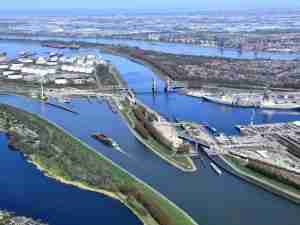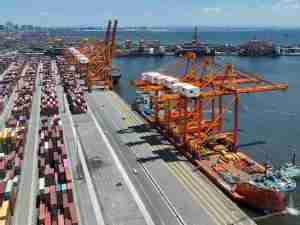Exports channelled through the Port of Barcelona were more than 63% above pre-crisis records
By: George Lauriat | Jul 23 2014 at 10:00 AM | Ports & Terminals
The Port of Barcelona closed the first half-year with 22.5 million tonnes of goods transported, representing a year-on-year increase of 7%. Growth affected all cargo segments and was driven by the boost in foreign trade, particularly exports.
The results, presented today by Port President Sixte Cambra and CEO Jose Alberto Carbonell, show how exports are leading the recovery in all cargo sectors and are now 63% above the pre-crisis peak levels reached in 2008. According to President Cambra, this trend highlights “the efforts being made by companies around us to position themselves on foreign markets and look for business prospects in new countries, while increasing the openness of our economy.”
Container traffic, a strategic line of business for the Port of Barcelona, increased 7% between January and July and stood at 886,040 TEUs (one TEU equals one 20-ft container). Import containers registered a significant improvement, growing by 11 % to reach 214,110 TEUs. Export containers are more significant in absolute terms, however, standing at 279,477 TEUs. This result represents an increase of 1 %.
China continues to be our reference market, with close to 115,000 TEUs in trade with the Port of Barcelona; in fact, 21 % of foreign trade containers in the Port start or end there. The emerging economies are among the Port’s main trading partners, and are experiencing very dynamic exchanges with Barcelona. The main increases are to be found with countries like China, Mexico and South Korea. Despite more modest volumes of trade, other countries have increased their flows with the Port: Colombia (+44%), Thailand (+23%) and Bangladesh (+50%).
Leader in vehicle traffic in the Mediterranean
The Port handled 386,869 vehicles (+6%) during the first half of the year. Again, foreign trade contributed significantly to this growth, with car exports increasing by 15% and imports by 8%. Vehicle exports were also significant, with nearly 230,000 units transported to various destinations, 25% higher than the record traffic levels of 2008.
Liquid bulk was the freight segment that grew the most during the period, with 6.1 million tonnes handled and an increase of 18 percentage points over the first half of last year. Significant growth was observed in diesel fuel (+64%), biofuels (+93%) and chemicals (+74%). These results are consolidating the Port of Barcelona’s role as a great logistics hub for the distribution of petroleum products.
As regards solid bulk, figures up to June show that the Port’s specialised terminals handled a total of 2.3 million tonnes, up 4% year on year. Two types of products performed particularly well: soya beans (+8%) and cement and clinker (+26%).
Promotion of the motorways of the sea
Goods traffic on the motorways of the sea (Short Sea Shipping) increased 13% over the same period in 2013 and exceeded 58,000 Intermodal Transport Units, or ITUs (one ITU is equivalent to one lorry, trailer or platform). These results were achieved thanks to the recovery in traffic with Italy, which had also been affected by the crisis in recent years. Furthermore, the loyalty of an operator such as Grimaldi (which last year set up its own terminal at the Port of Barcelona) is giving results in terms of boosting traffic. It is also important to remember that this figure translates to over 58,000 lorries effectively shifted from the roads to the maritime mode, which is more economically and environmentally more effective and sustainable.
The Port registered over 1.3 million passengers on ferries and cruises, representing a drop of 5% over the same period in 2013. Ferry passenger numbers increased 7% to 426,251, due mainly to the increase in passengers between Barcelona and Italy. The number of passengers arriving at the Port of Barcelona fell to 946,331, a decrease of 9%, driven by the overall reduction of supply in the Mediterranean. However, as CEO Jose Alberto Carbonell explained, future prospects are positive and the number of cruise passengers is expected to increase again between 2015 and 2016.
Financial results for the first half-year
The Port of Barcelona’s net turnover during the first half of the year fell to 74.2 million EUR, marking a 6% reduction. During this period, the Port registered a profit of 18.6 million EUR, 28% less than in the first 6 months of 2013. The Port’s cash flow totalled 40.5 million EUR (-8%).
Although total traffic grew by 7%, the drop in these economic indicators responds to reductions applied to port fees (-5%) and concession fees (-8%). The fall in income and benefits was also influenced by the policy of applying discounted fees, approved by the Port to boost traffic and contribute to the competitiveness of its operators and customers. This year the Port is planning to implement public investments amounting to 60.7 million EUR.










